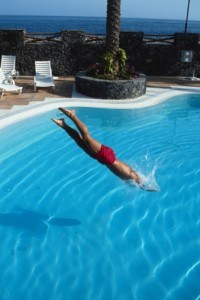Catastrophic Injury from Shallow Water Diving and Other Swimming Accidents
 With the warm days of summer upon us, more people will be swimming to stay cool and have fun. This is yet another opportunity to remind people about the dangers involved in shallow water diving. Drowning is not the only danger associated with swimming. Diving into water that is too shallow can result in a catastrophic spinal cord injury that can leave the victim with devastating injuries that will have an impact on the rest of their lives.
With the warm days of summer upon us, more people will be swimming to stay cool and have fun. This is yet another opportunity to remind people about the dangers involved in shallow water diving. Drowning is not the only danger associated with swimming. Diving into water that is too shallow can result in a catastrophic spinal cord injury that can leave the victim with devastating injuries that will have an impact on the rest of their lives.
The American Association of Neurological Surgeons (AANS) reports that an estimated 11,000 spinal cord injuries take place in the United States each year. About 80% of those injured are males. Diving is the fourth leading cause of spinal cord injury for men and fifth leading cause among women. The University of Alabama at Birmingham National Spinal Cord Injury Statistical Center says between 3 and five percent of spinal cord injuries are caused by diving accidents.
Shallow diving accidents are relatively rare, but they are completely preventable. Alan T. Brown, who is the Director of Public Impact for the Christopher & Dana Reeve Foundation, does not recommend that people live in fear of diving, rather he recommends instead that they make smarter decisions.
Diving safety tips
Here are some diving safety tips:
- Be sure of how deep the water is before you dive.
- Do not dive into water that is less than 12 feet deep.
- Never dive into an above-ground pool. Make sure that “No Diving” signs are posted around above-ground pools.
- Do not dive after drinking alcohol or taking drugs.
- If you are going to dive, make sure you have a partner with you.
The American Institutes for Research reports that 57% of all aquatic-related accidents occur in lakes and rivers while only about 30% occur in swimming pools with the remaining 12% unknown.
Catastrophic spinal cord injuries
Dr. Bohinski, MD, PhD, who is a neurosurgeon and Assistant Professor of Neurosurgery at the University of Cincinnati College of Medicine, said in a public service announcement for a brain and spine clinic, “When the entire weight of one’s body hits the bottom of a pool or rock, the force transmitted to the cervical spine is incredible.” Spinal cord injury from shallow water diving occurs when the bundle of nerves that runs up and down the spinal cord and controls the movement of your body and the operation of your organ systems gets injured by a severe trauma.
The severity of a spinal cord injury depends on the part of the spinal cord that is affected, according to the AANS. The higher up on the spinal cord the injury occurs, the more significant an impact it has on what parts of the body will be affected. A complete spinal cord injury causes the victim to lose all motor and sensory function below the level of the injury. The spinal cord does not have to be cut to cause a complete injury. Simply bruising the vertebrae or impinging the blood flow throughout the spinal cord can cause significant injury.
A person with a complete spinal cord injury who is unable to move below the shoulders will require ongoing medical care and support for the basic activities of daily living. Anyone who has suffered a complete spinal cord injury in an accident caused by the negligence of another might want to consider consulting with an experienced catastrophic injury attorney who can advise you about your legal options for compensation for your injuries.
A catastrophic injury changes the entire course of a person’s life. If you or a loved one has suffered a catastrophic injury caused by another person’s negligence, you may want to consult with an experienced Memphis personal injury attorney at Bailey & Greer, PLLC. We will discuss your case, answer your questions and review your legal options. You are welcome to contact us at 901-680-9777 today or fill out our contact form to schedule a free initial consultation to discuss your case.

As founder of Bailey & Greer, R. Sadler Bailey has battled his fair share of insurance giants and wrongdoers and has achieved numerous multimillion-dollar results for the victims of catastrophic injuries and their families. What’s more, he has been involved in more than 40 appellate court decisions affecting Tennessee personal injury law, including many landmark appearances before the Tennessee Supreme Court.
Read more about R. Sadler Bailey
